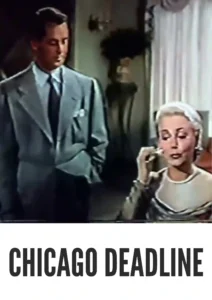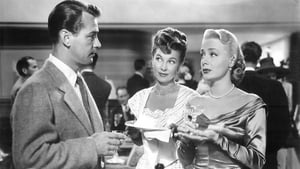Video Sources 0 Views
- Chicago Deadline 1949 Colorized


Synopsis
Table of Contents
ToggleA Gripping Tale of Crime and Intrigue: Chicago Deadline (1949) in Vivid Color

Step into the gritty world of post-war America with Chicago Deadline, a compelling crime drama from 1949 that has been beautifully colorized for a fresh viewing experience. This film, featuring the talented John Derek and Patricia Neal, immerses viewers in a narrative filled with suspense, moral dilemmas, and the relentless pursuit of truth. The colorized version enhances the film’s dynamic storytelling, making it an exciting choice for both classic film lovers and new audiences alike.
Chicago Deadline Storyline: Unraveling a Web of Deceit
Chicago Deadline follows the story of a dedicated newspaper reporter who finds himself embroiled in a dangerous investigation involving organized crime. As he delves deeper into the case, he uncovers a series of shocking truths that put his life and career at risk. The film intricately weaves themes of journalistic integrity, personal sacrifice, and the struggle against corruption.The protagonist’s journey is fraught with tension as he navigates through a landscape filled with deceit and danger. Alongside him is a strong female lead who provides both support and conflict as they confront their own beliefs about justice and morality. The film culminates in a dramatic climax that showcases the high stakes involved in uncovering the truth.
Movie Cast
The film boasts an impressive cast that brings this intense narrative to life:
- John Derek as the determined reporter
- Patricia Neal as his resourceful partner
- Paul Stewart as the antagonist
- Edward Arnold in a pivotal role
- John McIntire as a seasoned detective
Movie Genre
Chicago Deadline is categorized as a crime drama, blending elements of suspense and thriller that reflect the societal issues of its time. Its exploration of journalistic ethics and crime makes it a thought-provoking watch that resonates with contemporary themes.
Historical Context: A Reflection of Post-War America
Released in 1949, Chicago Deadline captures the essence of post-war America, where newspapers played a crucial role in shaping public opinion and exposing corruption. The film reflects the era’s challenges, including rising crime rates and societal changes, making it a relevant piece of cinematic history. While it may not have achieved the same level of fame as other films from this period, it offers valuable insights into the cultural landscape of its time.
Colorization Details
This colorized version of Chicago Deadline has been meticulously restored using cutting-edge digital techniques that breathe new life into this classic film. The colorization process involved careful analysis of the original black-and-white footage to ensure authenticity while enhancing visual appeal. Advanced algorithms were employed to select appropriate colors for each scene, creating an immersive experience that captivates modern audiences. This revitalization allows new viewers to appreciate this classic narrative while preserving its original essence.
Technical Details
- Director: Lewis Allen
- Screenplay: Richard Sale
- Cinematography: Charles Lang
- Edited by: Arthur Schmidt
- Production Company: Columbia Pictures
- Distributed by: Columbia Pictures
- Runtime: 85 minutes
Technical Specifications
- Download Format: MP4
- Resolution: HD (1080p)
- Compatibility: Compatible with most devices, including smartphones, tablets, computers, and smart TVs.
Reviews and Critical Reception
While Chicago Deadline (1949) may not be among the most celebrated films of its era, it is recognized for its engaging plot and strong performances by its lead actors. Critics have praised its exploration of serious themes related to journalism and morality. For fans of classic cinema, this film represents an important chapter in post-war storytelling that continues to resonate today.
FAQs
- Q: What is Chicago Deadline about?
- A: Chicago Deadline follows a reporter’s investigation into organized crime, highlighting themes of journalistic integrity and moral dilemmas.
- Q: Is Chicago Deadline (1949) well-known?
- A: While not as famous as other films from its time, it offers valuable insights into post-war America and journalism.
- Q: Is this version of Chicago Deadline colorized?
- A: Yes, this version has been professionally colorized for an enhanced viewing experience.
- Q: What makes Chicago Deadline interesting for classic film fans?
- A: The film’s exploration of journalism’s role in society provides thought-provoking commentary relevant to contemporary issues.
- Q: What is the download format?
- A: The download format is MP4, compatible with most devices.
- Q: What resolution is available for download?
- A: The resolution is HD (1080p), ensuring high-quality viewing.
Download Now in HD!
Watch Chicago Deadline Today!















